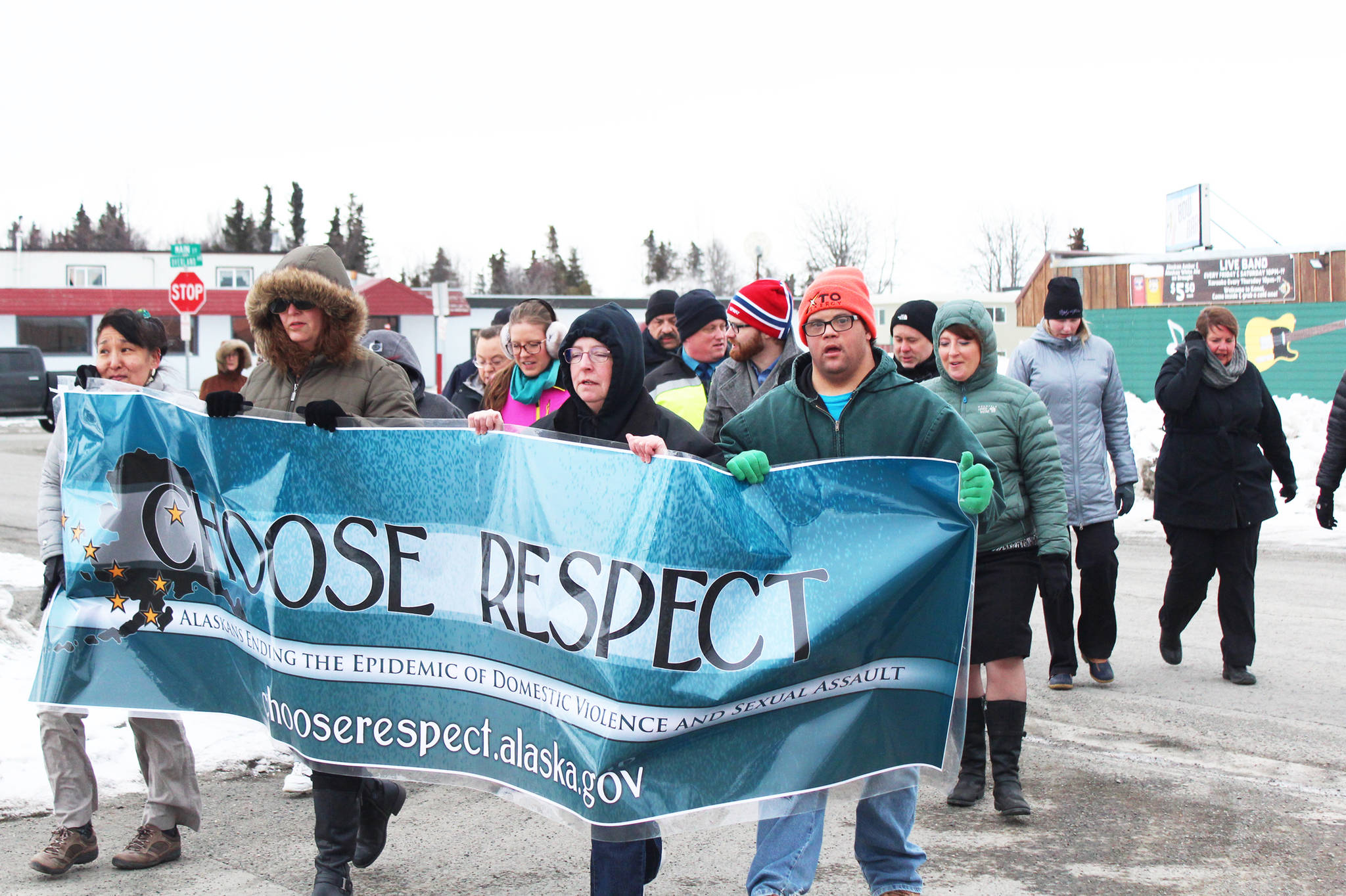Dozens of area residents trudged through Kenai’s trademark chilly winds, and even more joined them at the Kenai Chamber of Commerce and Visitor Center, in the name of choosing respect during an annual march and awareness event Thursday.
A statewide Alaska Victimization Survey, first conducted in 2010 and repeated in 2015, showed most recently that a full half of the women in the state of Alaska have experienced sexual violence, intimate partner violence or both within their lifetime.
Now in its eighth year in Kenai, the Choose Respect March began as an initiative created by former Gov. Sean Parnell in 2009. The main tenet of Thursday’s march and subsequent presentation was that, while no individual or single organization can hope to successfully reverse Alaska’s pervasive domestic and sexual abuse problem, long-term social change can be achieved when individual members of a community come together as a group and hold each other to a higher standard.
“The more that we all get together, the more prevention efforts we have, the more people are going to say, ‘Hey, it’s just not going to be tolerated in our community, nor should it be tolerated in our state,’” said Cheri Smith, executive director of Kenai’s LeeShore Center, during a presentation following Thursday’s march.
The Green Dot program is one measure that communities have somewhat recently taken up in Alaska that seeks to promote this greater social change. Created by the former director of a Violence Intervention and Prevention Center at the University of Kentucky, the Green Dot program offers “bystander training” for the average resident to promote tactics of intervention into potential acts of abuse and intolerance for power-based violence within communities.
Renee Lipps of the LeeShore Center said Alaska was the first state outside of Kentucky to apply the program to the community level rather than the college campus, and that cities and towns can sign on as “pilot communities” through the program. The LeeShore Center applied for a grant four years ago that would allow the program to be implemented on the central Kenai Peninsula, and was selected along with four other applicants in the state to receive it. The program is also in place in Homer, Anchorage, Fairbanks and at the University of Alaska Fairbanks.
Homer’s Green Dot program has been active in starting up and doing outreach, and Lipps said central peninsula program leaders are using it as a model. She and Ashley Blatchford, another LeeShore employee, first had to become certified trainers for the Green Dot curriculum before the local program could get off the ground, she said.
The objectives of Green Dot training are to replace “red dots,” or acts of personal violence within a community, with “green dots,” or actions that counteract that violence. These actions can be anything from directly interrupting a violent dispute between two people or calling the police, to creating a distraction or simply sharing information about the program on social media, Lipps and Blatchford said.
Lipps said the goal is for Green Dot to not be seen solely as a LeeShore program, but for it to take off and be owned by the central peninsula community at large.
Smith said while LeeShore has limited funding for prevention efforts like Green Dot when it comes to domestic and sexual violence, prevention has shown to be effective in Alaska. She cautioned that those effects will actually result in more women and men reporting violence and utilizing shelters and other resources, since greater prevention efforts mean encouraging victims of violence to feel more comfortable doing so. The key to decreasing rates of sexual and domestic violence is to treat it as any other social taboo, Smith said, like smoking or drunk driving.
“We’ve got to make those cultural changes so that the norm is nonviolence,” she said. “Because what it is right now is, basically, domestic violence works. You can do it (with) not a lot of consequences. It teaches batterers it’s OK to do it, and it teaches children this is what relationships are like, and it teaches victims, ‘Keep your mouth shut.’ We’ve got to change that, and the only way it’s going to change is if all of us give voice (to) and then also support victims who are going through it so that they can find their voice.”
The central peninsula’s first Green Dot bystander training will take place from 1-5 p.m. this Saturday at the Cook Inlet Aquaculture Building on Kalifornsky Beach Road. For more information, visit the Green Dot Kenai page on Facebook.
Reach Megan Pacer at megan.pacer@peninsulaclarion.com.

